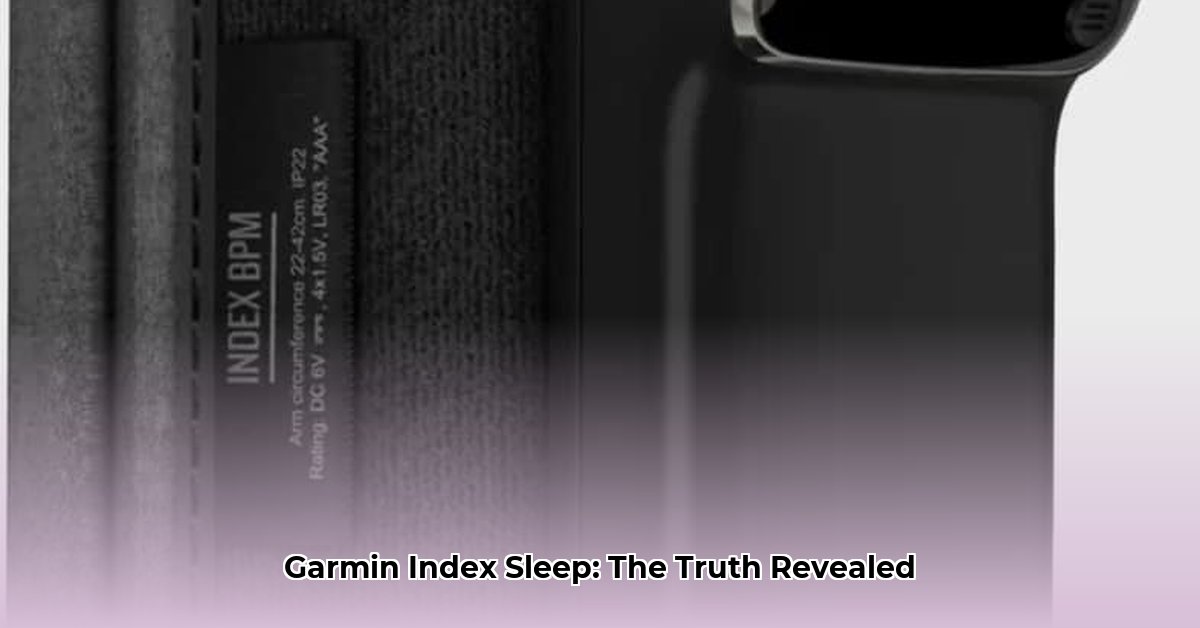
Is This Sleep Tracker Worth the Investment?
Thinking about buying the Garmin Index Sleep Monitor? You're not alone. Many are looking for ways to improve their sleep, and this device promises a detailed look at your sleep patterns – all without wearing a watch all night. But is it actually worth the rand? Let's unpack it. The Garmin Index offers detailed sleep analysis, including sleep stages, heart rate variability (HRV - a measure of your overall health and stress levels), blood oxygen levels (SpO2), and skin temperature. This is great data for optimising your sleep, but the price point is a significant consideration. Does the detail justify the cost? We'll dive into that.
User Experience: A Relaxing Night or a Toss-and-Turn?
Setting up the Garmin Index is generally described as a breeze by most users. The Garmin Connect app presents the data in clear, easy-to-understand charts and graphs, and you can see your sleep trends at a glance. However, the price tag is a major factor influencing user opinions. It's a substantial investment for many. While comfortable and lightweight, the lack of automatic sleep detection – requiring manual start-up each night – is a recurring complaint from users. Battery life, although decent, necessitates regular charging. Is this a deal-breaker? It depends on individual priorities. Do you value convenience above detailed sleep insights?
A Detailed Look at the Data: What the Garmin Index Tracks
The Garmin Index provides a comprehensive picture of your sleep. It monitors various parameters including:
- Sleep Stages: Light, deep, and REM sleep are meticulously tracked, giving you a clear understanding of the various phases of your sleep cycle. Understanding your sleep stages is crucial for improving sleep quality.
- Heart Rate Variability (HRV): This key metric provides information on your overall health and stress levels, providing crucial context to your sleep data. High HRV generally indicates better health and lower stress.
- Blood Oxygen Saturation (SpO2): Monitoring SpO2 gives insights into your respiratory health during sleep. Low SpO2 levels may indicate health issues requiring medical attention.
- Skin Temperature: Tracking your skin temperature can show trends in your body temperature throughout the night, providing further insight into your sleep patterns.
All this data seamlessly integrates into the Garmin Connect app, linking with other Garmin devices you may own – a considerable advantage for existing users.
Performance and Accuracy: Does It Live Up to the Hype?
The Garmin Index provides surprisingly accurate sleep tracking, especially regarding sleep stages. However, like any sleep tracker, its accuracy relies heavily on consistent use and proper placement. The device should be placed correctly and remain undisturbed throughout the night for optimal readings. Remember, the Index is a sleep tracker, not a diagnostic tool. It can highlight potential issues such as abnormal SpO2 levels but can't diagnose conditions like sleep apnea independently. Should you rely solely on the Garmin Index to assess sleep apnea? Absolutely not.
Comparing the Garmin Index to its Competitors: Who Wins?
The Garmin Index faces stiff competition from devices like the Whoop 5.0. The Whoop takes a holistic approach, tracking your activity levels throughout the day, while the Garmin focuses primarily on sleep. The Whoop offers a wider scope, but the Garmin Index’s strength lies in its detailed sleep analysis and integration into the larger Garmin ecosystem. The best device will depend on your individual needs and priorities.
The Good, the Bad, and the Slightly Less Good: A Summary of Pros and Cons
Let’s summarise the key points:
| Pros | Cons |
|---|---|
| Detailed sleep data (stages, HRV, SpO2, skin temperature) | Relatively high purchase price |
| Lightweight and comfortable design | No automatic sleep tracking – manual start-up required each night |
| Excellent integration with the Garmin Ecosystem | Battery life could be better; regular charging is needed |
| User-friendly app with clear data visualizations | Lack of independent clinical validation for sleep apnea diagnosis |
Should You Buy the Garmin Index Sleep Monitor? Our Verdict
Is the Garmin Index worth the investment? That depends on your specific requirements and budget. For committed Garmin users valuing detailed sleep data, the Index's in-depth analysis and seamless integration make it a worthwhile purchase. If budget is tight or you don’t use other Garmin devices, more affordable options might be sufficient. Consider your priorities: do you need detailed sleep tracking and seamless integration, or would a simpler, less expensive tracker meet your needs? There's no one-size-fits-all answer; research thoroughly to find the perfect fit for your sleep tracking needs.
Actionable Steps to Improve Your Sleep Data Accuracy
- Consistent Use: Wear it every night for long-term trend analysis.
- Proper Fit: Ensure a snug but not tight fit to avoid inaccurate readings.
- Environmental Awareness: External factors can affect readings.
- Combine Data: Don’t rely solely on the Index; consider other sleep indicators.
- Consult a Professional: If you have sleep concerns, see a doctor.
By following these steps and carefully considering your needs and budget, you can make an informed decision about whether the Garmin Index Sleep Monitor is the right choice for you.